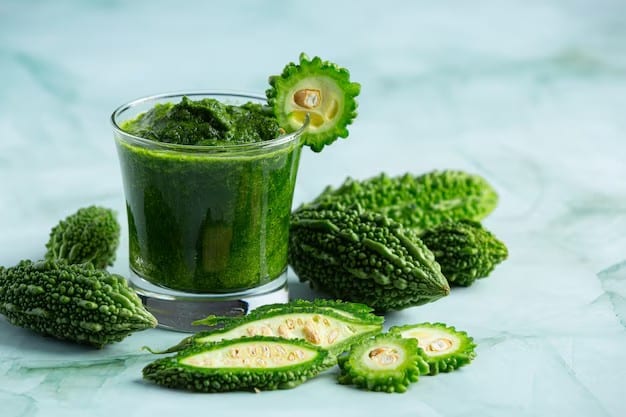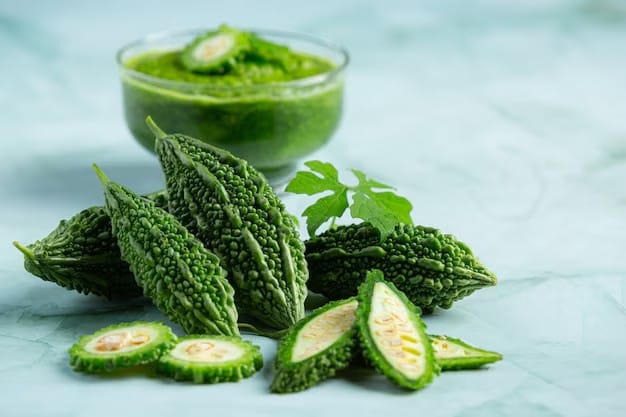Struggling with high blood sugar or looking for a natural way to boost your health? Though bitter, this nutrient-rich vegetable is a powerhouse of health benefits. Widely used in traditional medicine, it is known to help manage diabetes, support heart health, and even fight cancer. Bitter gourd is also available in supplement form, which many overlook due to its strong flavour. If you’re missing out on this superfood, it’s time to reconsider—your health may thank you for it!
Bitter Gourd: A Brief Overview
Bitter Squash Gourd, belonging to the Cucurbitaceae family, is a tropical vine found in regions of South America, Africa, and Australia, with an oblong fruit known for its warty exterior and bitter taste. The plant has simple leaves with three to seven lobes and can grow up to 5 meters long. The flesh, similar in texture to cucumber or green bell pepper, surrounds a seed cavity with flat seeds. Bitter Squash Gourd is best eaten when green or slightly yellow, with edible skin and bitter flesh that qualifies as an edible fruit.
Check out our bitter gourd recipes here.
Nutritional Profile of Bitter Gourd

Close up of a fresh bitter gourd
Bitter Gourd is a rich source of several key nutrients and bioactive compounds. It contains antioxidants, vitamins, particularly Vitamin C, and minerals. In addition, bitter gourd contains a considerable amount of dietary fibre that aids digestion and flavonoids that combat inflammation. Being low in calories, it is an excellent addition to a balanced diet as part of your regular diet.
Vitamins and Minerals
Bitter Gourd is packed with an impressive range of vitamins and minerals, making it a nutritional goldmine.
| Vitamins and Minerals | Quantity per 100g |
| Vitamin A | 471 IU |
| Vitamin C | 84 mg |
| Thiamine (B1) | 0.040 mg |
| Riboflavin (B2) | 0.040 mg |
| Niacin (B3) | 0.400 mg |
| Folate (B9) | 72 μg |
| Calcium | 19 mg |
| Iron | 0.43 mg |
| Magnesium | 17 mg |
| Phosphorus | 31 mg |
| Potassium | 296 mg |
| Zinc | 0.80 mg |
Each plays a vital role in our body’s functioning, from boosting immune health to aiding essential metabolic processes and maintaining bone health.
Bioactive Compounds
Bitter Gourd contains vitamins, minerals, and bioactive compounds like polyphenols, amino acids, and flavonoids. These compounds, which include the key constituents of the Indian variety of bitter melon and its rind, offer various health benefits. With over two hundred chemical constituents, including terpenoids, steroids, flavonoids, and alkaloids, Bitter Gourd’s medicinal value stems from this diverse blend of bioactive compounds.
Health Benefits of Bitter Gourd

Fresh bitter gourd juice with sliced pieces
Bitter Gourd is more than just a dietary staple; it’s a powerhouse of numerous health advantages. It stands out for its potential to manage diabetes, prevent and combat cancerous cells, provide antioxidant protection, and positively affect lipid profile and blood pressure. It also exhibits strong antimicrobial properties with anthelmintic benefits that deter parasites. Let’s delve deeper into these benefits.
1. Anti-Diabetic Properties
Bitter Gourd is known for managing diabetes with bioactive compounds like saponins and terpenoids that have hypoglycemic effects and positively affect blood sugar levels. These compounds help move glucose from the blood to cells, improve glucose processing in the liver and muscles, and contain an insulin-like compound called polypeptide-p or p-insulin. Bitter Gourd can improve glycemic control, making it a promising functional food for Type 2 diabetes prevention and treatment.
2. Anticancer Potential
Bitter Gourd’s various bioactive compounds, including antioxidants, may have anticancer properties. These antioxidants can inhibit cancer cell growth and trigger programmed cell death, especially in breast cancer cells, human nasopharyngeal carcinoma cells, and liver cancer cells, through both in vitro studies and additional clinical investigations. Regular consumption of Bitter Gourd and bitter melon extract may offer some protection against cancer.
3. Antioxidant Effects
Bitter Gourd contains antioxidants like Vitamin C, flavonoids, and polyphenols. These antioxidants combat oxidative stress by neutralising free radicals, potentially protecting against chronic diseases. Regular consumption can enhance your body’s antioxidant defence system for improved health.
4. Hypolipidemic and Hypotensive Effects
Bitter Gourd offers a wide range of benefits, focusing on improving lipid profiles and heart health. It lowers bad LDL cholesterol, increases good HDL cholesterol, and reduces triglycerides. Additionally, it shows promise in managing hypertension by inducing vasodilation and enhancing sodium secretion in urine to regulate blood pressure levels.
5. Anti-Microbial and Anthelmintic Benefits
Bitter Gourd offers numerous health benefits, significant antimicrobial activity, and anthelmintic properties. Studies sometimes measure active compounds at around 1 cm in size. In recent years, these properties have helped combat infections, bacteria, and parasites. The effectiveness of compounds like the Momordica anti-HIV protein (MAP30) in fighting diseases and parasites showcases their potential to prevent infections.
Culinary Uses of Bitter Gourd

Different uses of bitter gourd displayed
The versatile Bitter Gourd is integral to culinary traditions across several cultures for its unique flavour profile and health-enhancing properties. It is used extensively in a multitude of dishes across Asia. Bitter Gourd fits into any mould, whether stir-fried, boiled, braised, pickled, stuffed, or curried. It brings a refreshing sharpness to any dish it’s added to, which can surprisingly balance other flavours in the meal.
Cooking Tips and Techniques
Cooking with Bitter Gourd can be intimidating due to its bitter taste. To reduce bitterness, deseed and soak sliced Bitter Gourd in salt or lemon water before cooking. Cooking with young shoots of Bitter Gourd until golden brown will enhance flavours. Pair with spices like turmeric, cumin, and coriander or ingredients like coconut milk, tamarind, or lemon.
Traditional Dishes from Different Countries
Bitter Gourd features traditional dishes across diverse cuisines, highlighting its global culinary appeal.
| Country | Traditional Dish |
| India | Karela Samzi, Stuffed Karela, Pavakkai Fry |
| China | Stir-fried Bitter Gourd, Soups, Dim Sum |
| Philippines | Ampalaya Con Carne, Pinakbet |
| Japan | Goya Champuru, Aemono |
| Indonesia | Pare Stir Fry, Pare Soup |
These cultural dishes exhibit the remarkably nuanced flavours of Bitter Gourd while emphasising its healthful benefits.
Precautions and Potential Side Effects
Bitter Gourd offers numerous health benefits, but consume it in moderation. Overeating may result in gastrointestinal discomforts like stomach pain, diarrhoea, and nausea. In some cases, it can lead to hypoglycemia for those on diabetes medication. Pregnant women should avoid Bitter Gourd as it can induce uterine contractions and increase menstrual bleeding, posing a risk of miscarriage or pre-term labour.
Adverse Effects
Bitter Gourd offers many nutritional benefits, but overconsumption can have adverse effects. Excessive intake can lead to Hypoglycemia in people with diabetes and lower blood glucose levels too much. It may also cause stomach issues like pain, vomiting, diarrhoea, and nausea. Women with heavy menstrual periods should be careful as it can worsen bleeding. Moderation is key when consuming Bitter Gourd; consulting healthcare professionals is advised for any concerns.
Pregnancy Concerns
Avoid consuming Bitter Gourd during pregnancy due to its properties, which may pose risks. Certain compounds in it can trigger uterine contractions, potentially causing preterm labour or miscarriage. Consult your doctor before adding Bitter Gourd to your diet while pregnant for safety reasons.
Bitter Gourd Tea and Other Extracts

A cup of bitter gourd tea
Not a fan of its distinct flavour but still want to reap its benefits? Bitter Gourd tea or extracts come to your rescue! These popular forms allow you to take advantage of Bitter Gourd’s nutritional benefits without the inherent bitterness.
Preparation Methods
Bitter Gourd tea is prepared with slices by infusing dried vegetable slices in water. Simply boil the slices for about 15 minutes, strain and enjoy with honey or stevia if desired. The Bitter Gourd extract is generally available in capsule form. It can be taken according to the suggested dosage on the label or under the supervision of a health care provider.
Health Advantages
Bitter Gourd tea and extracts contain all the health properties of the vegetable, including antioxidants, anti-inflammatory, anti-diabetic, anti-cancer, and antimicrobial benefits. Studies support their effectiveness in managing diabetes, improving lipid profile, boosting immune health, aiding digestion, enhancing skin health, and promoting overall well-being. Incorporating Bitter Gourd tea and extracts into your diet is a great way to benefit from its health advantages.
Delicious Bitter Gourd Dishes You Must Try!

Various dishes made using bitter gourd
If the bitter taste of bitter gourd has kept you away, these flavourful dishes might change your mind! Here are some must-try recipes that bring out the best in this nutritious vegetable:
- Bitter Gourd Masala Curry – A spicy and tangy curry that pairs perfectly with rice or roti.
- Bitter Gourd Sambar – A south indian lentil stew infused with tamarind and aromatic spices.
- Crispy Bitter Gourd Chaat – A crunchy and flavourful snack topped with chutneys and spices.
- Bitter Gourd Rice – A simple yet delicious one-pot dish packed with spices and health benefits.
- Bitter Gourd Methi Rice – A unique combination of bitter gourd and fenugreek leaves, offering a rich, earthy taste.
Try these recipes and turn this underrated vegetable into a favourite on your dining table!
Conclusion
Momordica Charantia, or Bitter Gourd, is a nutrient-rich functional food made from various plant parts. It contains nutrients similar to those found in pumpkin and zucchini. Bitter gourd offers numerous health benefits, from diabetes management to cancer prevention. Common in traditional dishes worldwide, it seamlessly combines nutrition with taste. It is suitable for all palates and is available in various forms, such as tea and extracts. Integrating Bitter Gourd into your diet can enhance overall health and well-being.
Frequently Asked Questions
What is bitter gourd good for?
Bitter Gourd offers numerous health benefits, including essential oils and fatty acids. It’s well-known for its anti-diabetic properties and potential anti-cancer effects. Bitter gourd seed provides antioxidant protection, helps manage hypertension, improves lipid profile, and shows antimicrobial properties. Future clinical trials may explore its full potential.
Who should not eat bitter gourd?
While Bitter Gourd is generally safe for most people when consumed in moderation, it may not be suitable for some. These include pregnant women, individuals on diabetes medication, and people suffering from liver disease.
Is bitter gourd high in potassium?
Yes, Bitter Gourd is a good source of potassium. A 100g serving contains approximately 296mg of potassium, contributing to essential body functions such as heart and muscle.
Is bitter gourd good for high blood pressure?
Yes, Bitter Gourd may help control high blood pressure due to its diuretic and potassium-rich nature, which helps regulate the rigid walls of the blood vessels, making it beneficial for hypertension patients.












